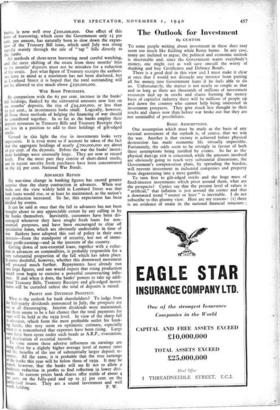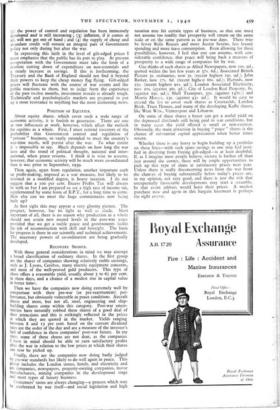The Outlook for Investment
By CUSTOS To some people writing about investment in these days may seem too much like fiddling while Rome burns. In any case, many are inclined to argue, the political and economic outlook is inscrutable and, since the Government wants everybody's money, one might just as well save oneself the worry of thinking and buy Certificates and Defence Bonds.
There is a good deal in this view and I must make it clear at once that I would not dissuade any investor from putting all his money, into Government loans if he feels able to do so. Unfortunately, the matter is not nearly so simple as that and so long as there are thousands of millions of investment resources tied up in stocks and shares forming the money basis of capitalist industry there will be millions of people up and down the country who cannot help being interested in investment prospects. They give much less thought to their stocks and shares now than before war broke out but they are not unmindful of possibilities.
BASIC ASSUMPTIONS.
One assumption which must be made as the basis of any rational assessment of the outlook is, of course, that we win the war. Another is that victory is achieved before physical destruction has made economic life virtually impossible. Fortunately, the odds seem to be strongly in favour of both these assumptions being justified by events. So far as the physical dami-ge risk is concerned, while the amounts involved are obviously going to reach very substantial dimensions, the Government's compensation plans, by spreading the burden, will prevent investment in industrial companies and property from degenerating into a mere gamble. To turn first to gilt-edged stocks and the huge mass of fixed-interest investments which pivot around them, what are the prospects? Cynics say that the present level of values is " artificial," that inflation is just around the corner and that a downward trend " sooner or later " is inevitable. I do not subscribe to this gloomy view. Here are my reasons: (i) there is no evidence of strain in the national financial structure ; (2) the power of control and regulation has been immensely developed and- is still. increasing .; (3) inflation; if it comes at all, will not .get out- of hand ; and (4) the supply of cheap and abundant credit will remain an integral part of Government policy not only during but after the war.
In expressing this faith in the level of gilt-edged prices I must emphasise that the public has its part to play. At present co-operation with the Government must take the form of a resolute cutting down of expenditure on non-essentials and a steady increase in savings. If this is forthcoming, the Treasury and -the Bank of England should not find it beyond their powers to keep the cheap money flag flying. Gilt-edged prices will fluctuate with the course of war events and the public reactions to them, but to judge from the experience of the past twelve months, investment morale is already tough. Technically and psychologically markets are prepared to put up a stout resistance to anything but the most distressing news.
POSITION OF EQUITIES.
About equity shares, which cover such a wide range of economic activity, it is foolish to generalise. There are one or two influences at work, however, which affect the outlook for equities as a whole. First, I must remind investors of the probability that Government control and regulation of " private " business, so vastly extended to meet the country's war-time needs, will persist after the war. To what extent it -s impossible to say. Much depends on how long the war lasts and the trend of political thought, national and inter- national, when peace returns. I think it is wise to assume, however, that economic activity will be much more co-ordinated than it was prior to September, 1939.
Then again, apart from regulation, another important curb on profit-making, imposed as a war measure, but likely to be retained in a modified degree, is heavy taxation. I do not suggest that a roo per cent. Excess Profits Tax will always be with us but I am prepared to see a- high rate of income tax, supplemented by some form of E.P.T., for a long time to come. How else can we meet the huge commitments now being built up?
At first sight this may appear a very gloomy picture. The prospect, however, has its light as well as shade. Most important of all, there is no reason why production as a whole should not attain new record levels in the post-war years provided that we get a stable peace and governments tackle the job of reconstruction with skill and foresight. The basis for progress is there in our scientific and technical achievements. The necessary powers of co-ordination are being gradually developed.
RECOVERY SHARES.
With those general considerations in mind we may attempt a broad classification of ordinary shares. In the first group are the shares of companies showing relatively stable earnings, such as J. Lyons, Cerebos, many electric equipment concerns, and most of the well-proved gold producers. This type of share offers a reasonable yield, usually about 5 to 6+ per cent. in these days, and a chance of a modest rise in capital value in better times.
Then we have the companies now doing extremely well by comparison with their pre-war (or pre-rearmament) per- formance, but obviously vulnerable in peace conditions. Aircraft shares and most, but not all, steel, engineering and ship- building shares come within this category. Post-war uncer- tainties have naturally robbed these shares of a good deal of their attractions and this is strikingly reflected in the prices at which they are quoted in the market. Yields ranging between 8 and 15 per cent. based on the current dividend rates are the order of the day and are a measure of the investor's lack of confidence in these companies' post-war future. In my view, some of these shares are not dear, as the companies I have in mind should be able to earn satisfactory profits after the war in relation to the low prices at which their shares can now be picked up.
Finally, there are the companies now doing badly judged by pre-war standards but likely to do well again in peace. This group includes the London stores, hotels, and electricity and gas companies, newspapers, property-owning companies, motor manufacturers, mining companies in the development stage and most types of luxury business.
Consumers' tastes are always changing—a process which may be accelerated by war itself—and social legislation and high taxation may hit certain types of business, so that one must not assume too readily that prosperity will -return- on the same scale or on the same pattern as in pre-war days. There may be fewer Rolls Royces and more Austin Sevens, less luxury spending and more mass consumption. Even allowing for these possibilities, however, I feel that one can assume, with con- siderable confidence, that peace will bring back a measure of prosperity to a wide range of companies hit by war.
One thinks of such shares as Allied Newspapers, now los. 9d., quoted within the last few years at 37s. 6d.; Associated British Picture 5s. ordinaries, now 5s. (recent highest 19s. 9d.); John Barker, now 27s. 6d. (recent highest 86s. 9d.); Harrods, now 25s. (recent highest 91s. 9d.); London Associated Electricity, now 20S. (against 36s. 3d.); City of London Real Property, 8s. (against 19s. 9d.); Shell Transport, 35s. (against 147s.); and Morris Motozs, 23s. (against 435 9d.). It would be easy to extend the list to cover such shares as Courtaulds, London Brick, Trust Houses, and many of the developing Kaffir shares, like West Wits., Ventetspost and Libanon.
On some of these shares a buyer can get a useful yield on the depressed dividends still being paid in war conditions, but in many cases the yield offered is small or non-existent. Obviously, the main attraction in buying " peace " shares is the chance of substantial capital appreciation when better times return.
Whether there is any hurry to begin building up a portfolio on these lines—with such spare savings as one may feel justi- fied in diverting from buying gilt-edged—is at least doubtful. If, as I imagine most people believe, victory is farther off than just around the corner, there will be ample opportunities to pick up this type of share at satisfactory prices next year. Unless there is really disconcerting news from the war front the chances of buying substantially below today's prices are, in my opinion, not very good, and there is just the risk that unexpectedly favourable developments may start a scramble. In that event jobbers would hoist their prices. A modest purchase now and again in this bargain basement is perhaps the right course.







































 Previous page
Previous page